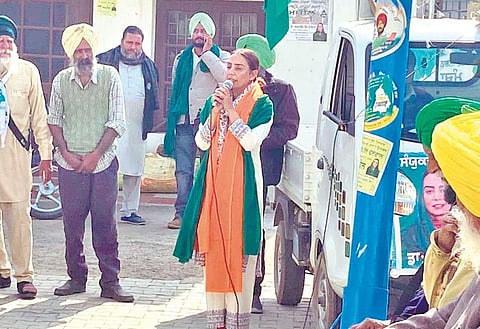

SANGRUR/BARNALA/BATHINDA (Punjab): A petite middle aged woman in an off white salwar kameez with saffron and green stoles draped on her neck addresses a gathering of about 100 at Sidhupur village, Fatehgarh Sahib, the men and women segregated by a kerbstone lane opposite a white-domed gurdwara.
“Farmer incomes are not increasing, our youth don’t have jobs while corruption is rampant. Politicians own big vehicles, have massive homes while the poor are crushed,” bellows Amandeep Kaur, 43, displaying none of the flatulence or pious claptrap of a seasoned politician.
Kaur is a political newbie, a candidate of the Sanyukt Samaj Morcha, the freshly-minted political party of 22 farm unions that had agitated for over a year against the now consigned-to-the-dustbin farm laws.
A qualified doctor, she was attached with the Punjab Police as a medical officer before trading the khaki for the khadi. She claimed to have spent months at Delhi’s Tikri border during the agitation, treating farmers and sundries for free.
“The youth are taking loan and migrating abroad for a living. This must stop as Punjabiyat is in danger,” she said after her short, inanity-free monologue. Kaur, Paramdeep Baidwan and Ravneet Singh Brar are among the young, idealistic poster boys of the SSM, testing the murky and manipulative waters of politics. “We are in it to change the mode of governance,” said Baidwan, a budding peasant leader attempting a transformational leap.
“We are strong in 20-22 seats,” claimed Manjit Singh, a retired Panjab University professor and the SSM’s left-leaning intellectual lodestar. The new party is contesting in 104 of the total 117 assembly seats. But the SSM’s optimism does not seem to be shared by the public and farmers who have not entered the political arena. “We will oppose them, if they come here to seek our votes we will not give them water even,” said Darshan Singh, 71, a farmer in Sheikpura village, Bathinda, spent months at the Tikri border. His organisation, the Bharatiya Kisan Union Ekta-Sidhupur, is not only not contesting the elections but is still in agitation mode, having taken over a toll plaza on a state highway in order to allow vehicles to pass without any charge.
“The land for this toll gate was given by me, but look at the condition of the road? Didn’t you come across a broken stretch on the way here,” he asked as the early morning sun broke through the fog, drenching the lustrous wheat and mustard fields. A truck driver stops briefly to hand over `50 in solidarity with the agitators and he is given a cup of tea in return. “See we have support among the people, we did not ask the trucker to give us money, he himself donated this,” Darshan said, pointing to the currency note, before another uncontrolled bristle at the SSM.
“Leading an agitation is one thing, politics is another. The SSM shouldn’t have contested as they don’t have any support,” said Surinder Sharma, 37, while serving king-sized stuffed paranthas with a dollop of butter and curd for breakfast at his dhaba in Gharachon, Sangrur. The sentiment is echoed by farmers at a tractor fair in Talwandi Sabo, the seat of one of the five takhts, or temporal authority, of Sikhism. “The SSM is the Bharatiya Janata Party’s B team,” said Rupinder Singh, 32, who had come from Sardargarh village in Bathinda to sell his tractor. “What was the hurry to form a political party? It has no strategy, no manifesto. Had they formed the party now and worked among the people then they would have been ready for the 2027 polls,” said Harshdeep Singh, 30, another farmer at the fair.
The SSM is still an amorphous entity, without a structure or cadre, having got recognition as a political party by the Election Commission only last week. Balbir Singh Rajewal is the putative leader but on the ground its candidates are fighting their own battles. Besides, it’s newly-allotted symbol is as yet unknown among most.
There are an estimated 50 lakh farmers in the state, there is no official figure, out of a total population of a little over 200 lakh. Of these about 85-90% are Jat Sikhs, who constituted the bulk of the anti-farm law agitators.
The Jat Sikhs, about 26% of the population, has dominated the political landscape, with every chief minister barring incumbent Charanjit Singh Channi, belonging to this community. They also corner most of the representation in the cabinet. So the attritional farm agitation was essentially a battle between the governing class of Punjab and ruling class of Delhi, with the Delhi durbar having to retreat in humiliation.
The SSM perhaps wants to ride the crest of an internationally headline-making successful agitation. The farmers have sowed the political seed, but the big question is whether they will reap a rich harvest.